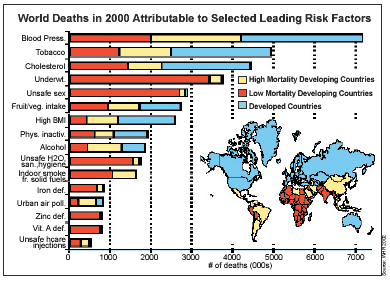
by Dr. Derek Yach, Executive Director, Noncommunicable Diseases and Mental Health, World Health Organization, Geneva

The report provides compelling data. In developed countries, and in lower middle-income countries such as Brazil, China and Thailand, six of the top 10 risks to health are directly related to cardiovascular disease (CVD), cancers and other chronic diseases, it reveals. These risks include tobacco use, high blood pressure, high blood cholesterol, increased body mass, low fruit and vegetable consumption, excess alcohol intake and physical inactivity. [see full article...]
Russian Cancer Center to Motivate, Train Doctors in Tobacco Control
by Dr. Vladimir Levshin, Russian Institute of Carcinogenesis, Moscow
Russia has one of the highest smoking prevalences in the world: 63 percent of men and 10 percent of women there smoke. 
Despite this health and human toll, however, efforts to control tobacco use in Russia are minimal and, for the most part, ineffective. In fact, the effect of tobacco addiction is underestimated, and little cessation help is provided in-country – with no professional cessation counseling or assistance available in the national public health service at all. Moreover, smoking prevalence among Russian physicians mirrors that of the general population, hence the majority of them cannot model non-smoking behavior and maintain little or no interest in providing smoking cessation counseling to patients. Ironically, these same physicians may be the best source of a clear, strong and personalized cessation, or for that matter smoking prevention, message, especially since health professionals (doctors in particular) are traditionally perceived as the most valuable, credible and reliable source of health information (Fowler, 1997).
There is a critical need for cost-effective, popular, available and applicable methods to encourage and train physicians in the Russian Federation to champion smoking cessation among patients. [see full article...]